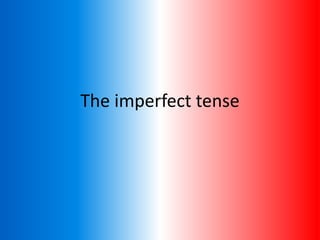
The imperfect tense
- 2. Uses of the imperfect tense • To describe a continuous action in the past Quand j’étais jeune, je regarderais la télé tous les jours. • To describe what something or someone was like in the past Quand j’avais deux ans, ma mère avait les cheveux bruns. • With depuis when the action lasted for some time but it doesn’t happen now Il habitions en Irlande depuis une année quand sa grand-mère est mort. • After si when followed by a conditional clause Si tu rangiez ton chambre, ce serait propre. • In reported speech La semaine dernière, mon ami a dit qu’il n’aimait pas le rugby.
- 3. Formation of the imperfect tense First, take the NOUS form of the infinitive in the present tense. Eg: Aller = to go Nous allons Then, knock off the ONS and add the following endings depending on the subject. J’allais Tu allais Il/Elle/On allait Nous allions Vous alliez Ils/Elles allaient
- 4. With the imperfect tense, all of the infinitives are irregular except être where instead of using the nous form in the present tense, the stem is ÉT. Être = to be J’étais Tu étais Il/Elle/On était Nous étions Vous étiez Ils/Elles étaient
- 5. There are also verbs that have some small spelling changes. • Verbs like MANGER have an extra E before the A Je mangeais, Elles mangeaient • For verbs like COMMENCER, change the C to a Ç before the A Tu commençais, Il commençait